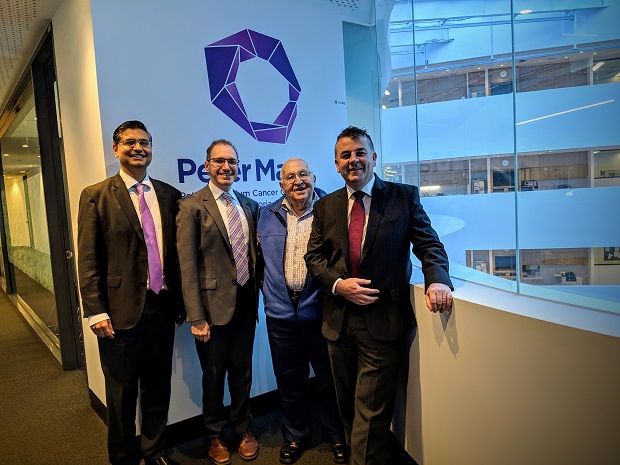New $5.4 M alliance to tackle prostate cancer
University of Melbourne researchers at the Peter MacCallum Cancer Centre have received a major funding boost ($5.4 M) for two new clinical trials of a game-changing radioactive molecule, purpose made to kill prostate cancer cells.
The treatment, LuPSMA (Lutetium-177 PSMA-617), has been pioneered by Professor Michael Hofman, a nuclear medicine physician at Peter Mac.
This novel approach uses a radioactive molecule that binds to prostate specific membrane antigen (PSMA), a protein overexpressed in prostate cancer cells, enabling delivery of high doses of radiation to kill tumours.
The particles only travel 1 mm resulting in a highly targeted therapy with minimal impact on neighbouring healthy cells.

Associate Professor Arun Azad and Professor Hofman will jointly lead this new project called the "Upfront PSMA Alliance".
Until now, this treatment has been studied as a "last-line" of therapy after standard options have been exhausted.
This new funding will enable the treatment to be used as a first line therapy, and hopefully extend the lives of men with prostate cancer.
The first aim of the study will be to conduct an Australian wide randomised phase II study in patients with newly diagnosed metastatic prostate cancer.
The study will compare whether the addition of LuPSMA to the current standard-of-care of androgen deprivation therapy and chemotherapy will improve patient outcomes.
In a second aim, patients with high-risk localised prostate cancer will be given LuPSMA prior to undergoing a radical prostatectomy.
We will evaluate scan and pathology findings to see whether this is a successful strategy to reduce recurrence rates.
As part of this alliance, Professor Gail Risbridger will also lead a study to determine if CAR T-cells can exhibit anti-tumour activity in pre-clinical prostate cancer models not expressing PSMA.
This is an important study addressing an unmet need for patients whose cancer do not express PSMA.
The grant, provided by the Movember Foundation and Cancer Australia, is further supplemented by an additional $1.4 M of leveraged support from the Peter MacCallum Cancer Foundation, the University of Melbourne, Victorian Cancer Agency, Monash University, and the EJ Whitten Prostate Cancer Research Centre at Epworth Healthcare.
It is also enabled by support from industry partner Endocyte.
The first patients are expected to be enrolled before the end of 2019.